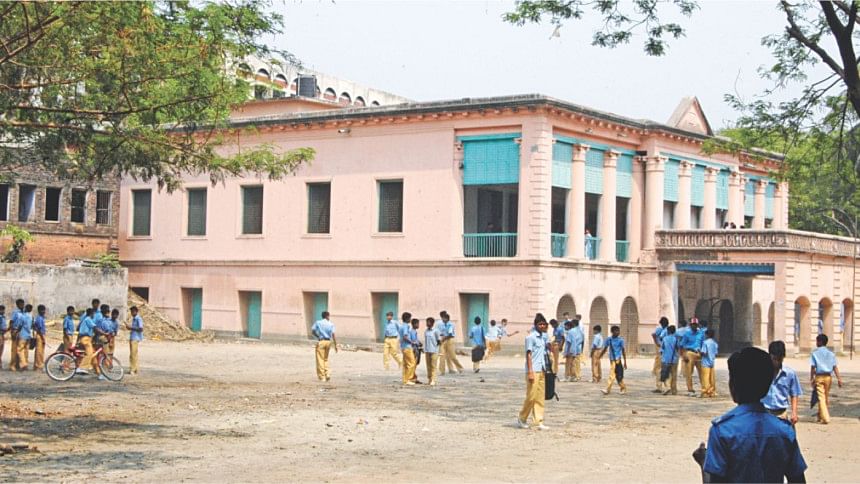And Shadows Flee Away

The Armenians of Dhaka were a rich and swanky lot. The church that they built in 1781 (Church of the Holy Resurrection) and the area where it stands (Armanitola, named after Armenians) both reflect the influence of this community. They were affluent merchants and landlords, ruling over markets of jute, leather, salt, etc. Marcar David, for example, was known as the Merchant Prince of Bengal.
Another such figure was Joakim G. Nicolas Pogose, popularly known as Nicky Pogose. Today, he lies buried in an exquisite and apparently expensive tombstone in Narinda Christian Cemetery. His epitaph reads:
Till the day break and
Shadows flee away.
He passed away in 1876. His tombstone, with the borrowed lines from Song of Solomon, is not his only legacy. He had left something for which Dhaka will be indebted to him forever. He built a school.
Pogose School is not an ordinary one. It is the first private school in Dhaka. Established in 1848, the school was initially housed in the ground floor of the residence of Pogose. He was also the first headmaster of the school.

It has been argued that the school existed since 1946, in some form and size, going by the name Union School. When it became endangered due to lack of funds, the Armenian philanthropist stepped up. The school was then called 'Pogose Anglo Vernacular School at Dhaka'.
Around 1850, the revenue of the school was Rs50 whilst the expenditure was Rs90. This deficit was compensated by Pogose.
Today, Pogose School stands on a 5-acre campus, with an old, majestic building and a playground.
Pogose School's alumni boast many notable figures, including poet Shamsur Rahman, former Prime Minister of Bangladesh, Ataur Rahman Khan and the first translator of the Holy Quran in Bengali, Girish Chandra Sen.
Pogose School carries a rich legacy whilst reminding us of an enterprising people and their hand in shaping Dhaka to what it is today.
Current endeavours
Recently, a joint meeting was held between Pogose School and Jagannath University. The school will be merged with the university, renaming it 'Pogose Laboratory School and College, Jagannath University'.
"It will raise the overall standard of the school," said Md. Ohiduzzaman, Registrar, Jagannath University, when confirming about the merger. "As for the university, it will be using it as a laboratory school for its Institute of Education and Research (IER)."
But the decision has not been welcomed by all; many see it as a blow to the heritage. "Pogose School is now vulnerable in losing its unique identity," opined Taimur Islam, CEO, Urban Study Group.
Ohiduzzaman believes that this would not be the case. "We are not removing the name, Pogose," he rationalised, also assuring that the heritage building will be conserved.
"The playground of the school is used by the children of the school and those of the whole locality. The field is also used when making statues for Durga Puja festival. What will be the situation with the field when it is under the university?" Taimur raises concerns.
Ohiduzzaman had said that the school's playground will always be for the children.
People are also concerned about the 'hurry' with which the merger had been sealed. "This is untrue. The authorities from both the institutions have sat many times before finalising anything," Ohiduzzaman informed.
Will the legacy of Nicky Pogose continue to live? Time shall tell.

 For all latest news, follow The Daily Star's Google News channel.
For all latest news, follow The Daily Star's Google News channel. 



Comments